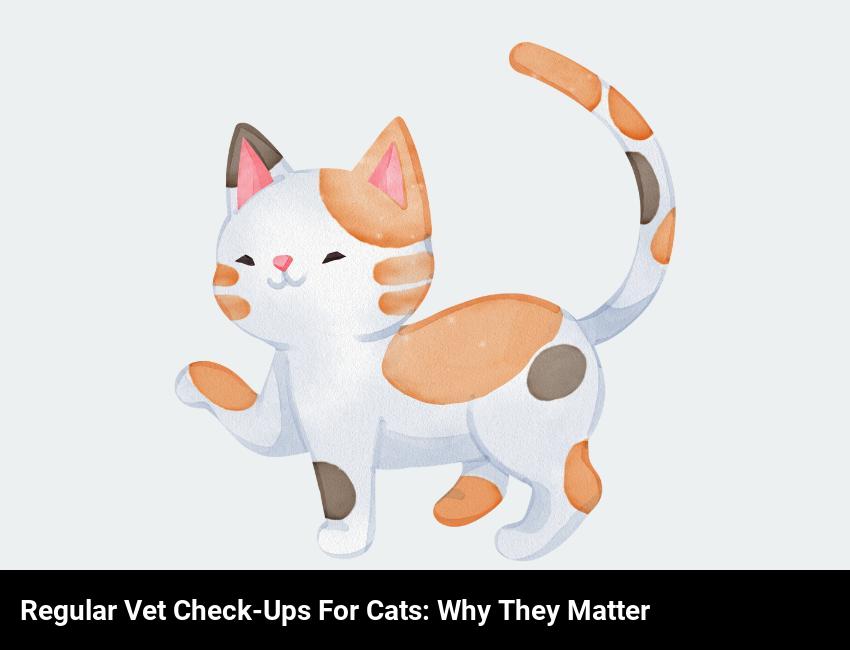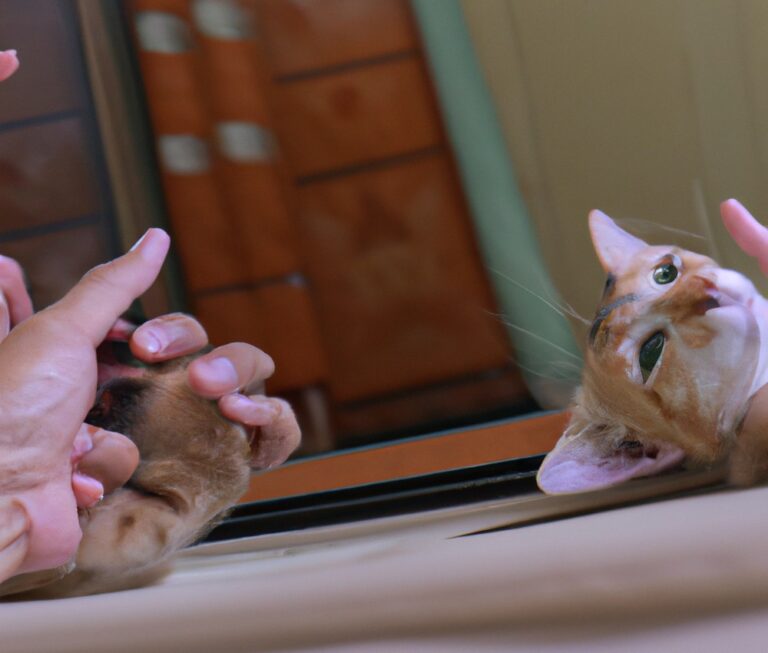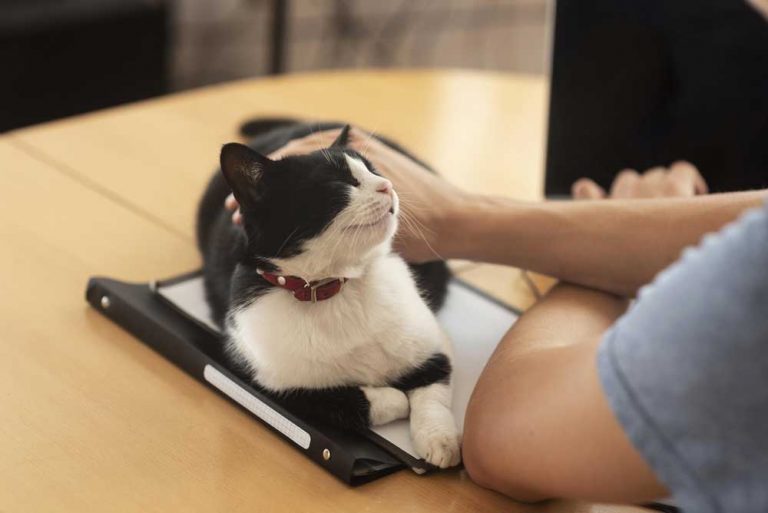The Importance Of Regular Vet Check-Ups For Cats
Regular vet check-ups are essential for cats to maintain their health. They help detect and prevent health problems that may develop, as well as aid in the diagnosis and treatment of existing medical conditions. Regular check-ups ensure cats lead long, healthy lives.
When it comes to taking care of my cat, there’s nothing more important to me than making sure she’s always healthy and happy. That’s why I always make sure to take my cat to the vet for regular check-ups. Not only do regular check-ups help to catch any potential health issues early on, but it also gives me peace of mind knowing that my cat is in good hands every time she visits the vet.
At the vet, I’m able to ask questions about my cat’s health and get advice from the professionals about what to look out for in terms of signs that may indicate a problem. They also perform tests to make sure my cat is in optimal health and provide the necessary vaccinations.
But, how often should I take my cat to the vet? What should I do if she shows signs of illness or injury? In this blog, I’ll be discussing all this and more, so that you can ensure your cat is getting the best care possible.
What signs might indicate that your cat needs to visit the vet?
As a cat owner, it’s important to know when your feline companion needs to go to the vet. After all, regular check-ups are key to keeping your cat healthy and happy! Here are some signs that you should take your cat to the veterinarian as soon as possible:
- Changes in Appetite: If your cat has suddenly lost its appetite or is refusing to eat, it may be a sign of an underlying medical condition. Don’t wait—get your cat checked out by a vet!
- Changes in Behavior: A sudden change in behavior can be a sign of illness in cats. If your cat is sleeping more than usual, not playing or interacting with you, or has become unusually aggressive, it’s time to take your kitty to the vet.
- Vomiting/Diarrhea: If your cat is having episodes of vomiting or diarrhea, it could be caused by a number of issues—so it’s best to take your cat to the vet for a check-up.
- Difficulty Breathing: Cats can sometimes have trouble breathing, which can be a sign of a serious medical condition. If you notice your cat having trouble breathing, or if it’s making unusual sounds when it breathes, it’s vital to take it to the vet right away.
- Weight Loss: If your cat is losing weight quickly and inexplicably, it could be a sign that something is wrong. Schedule a vet visit to make sure your cat is healthy.
It’s important to take your cat to the vet regularly for check-ups, and even more important to be aware of any changes in your cat’s behavior, appetite, or health.
What are the benefits of taking your cat for regular vet check-ups?
Taking your cat for regular vet check-ups is incredibly important for your pet’s health and quality of life. Here are some of the benefits of taking your cat for regular vet check-ups:
- Early Detection and Treatment: Regular vet check-ups help to identify any potential issues or diseases early, allowing for more successful treatment and prevention.
- Developing a Relationship: Over time, you and your vet will develop a relationship of trust and understanding, which can be invaluable in emergency situations.
- Vaccinations: Regular check-ups are the best way to make sure your cat is up to date on all their vaccinations.
- Parasite Treatment and Prevention: During your cat’s check-up, your vet can also check for any parasites and provide effective treatment and prevention.
- Nutrition Plan: Your vet can put together a nutrition plan tailored to your cat’s specific needs and lifestyle.
- Behavioural Health: Your vet can check for any changes in your cat’s behaviour and provide advice on how to manage it.
- Stress relief: Regular vet check-ups can help to reduce stress in cats, as they become more familiar and comfortable with the vet visit.
Overall, regular vet check-ups are incredibly important for your cat’s health and wellbeing. Taking your cat for regular vet check-ups can help identify potential problems early, develop a relationship of trust with your vet, keep vaccinations up to date, prevent and treat parasites, create a tailored nutrition plan, check for changes in behaviour, and reduce stress in cats.
What types of tests are typically performed during a vet check-up?
It’s important to take your cat to the vet for regular check-ups, and when you do, there are a few tests that will typically be performed. The first is a physical exam. Your vet will palpate your cat’s abdomen, check their eyes and ears, and take their temperature. They will also look for any signs of parasites, skin or coat problems, or any other signs of illness.
Next, your vet might perform some laboratory tests. This could include a complete blood count, urinalysis, and biochemistry profile. This will help them get a better understanding of your cat’s overall health and alert them to any potential issues.
Finally, your vet might recommend some additional tests depending on your cat’s age, breed, lifestyle, and any other factors. For instance, they might suggest a feline leukemia virus (FeLV) or feline immunodeficiency virus (FIV) test if your cat is at risk of exposure. They might also want to run an X-ray or ultrasound to check for joint problems or organ abnormalities.
By taking your cat to the vet for regular check-ups, you can detect any potential issues early on and ensure that your cat is always in the best of health. Talk to your vet about which tests are best for your cat and how often they should be done.
What vaccinations should your cat receive?
If you have a cat, it’s important to get it vaccinated regularly. Vaccinations help keep your cat healthy, and protect them from diseases they may encounter in their environment. Vaccines are available that protect cats against a range of serious illnesses, including feline distemper, feline leukemia, and rabies.
When you take your cat in for its regular check-up, your vet will recommend the vaccinations that are best for your pet. Depending on where you live and the lifestyle of your cat, your vet may recommend additional vaccinations. Make sure to ask your vet about the potential benefits of each vaccine and any risks associated with them.
Vaccinations for kittens are generally started at 6-8 weeks old, and then continued every three to four weeks until the cat reaches 16 weeks of age. After that, vaccinations are typically administered on an annual basis.
Make sure to keep track of your pet’s vaccinations and update your vet if they miss one of their shots. It’s also important to talk to your vet if your cat spends a lot of time outdoors and may be exposed to more illnesses, as they may recommend additional vaccinations.
The health and wellbeing of your cat is a top priority, and regular vet check-ups are essential for keeping them healthy and happy. Vaccinations are a great way to protect your cat against serious illnesses, so make sure to get them the shots they need.
How often should you take your cat for a vet check-up?
It’s important to take your cat for a vet check-up every year. This ensures they’re in the best possible health and gives you the chance to spot any potential health issues early on.
If your cat is a senior (7 years or older) then you may want to consider taking them for check-ups twice a year. This will help your vet to detect any changes or health issues that may come up.
If you’ve recently adopted a cat, take them to the vet straight away. This will help to ensure that your new pet is healthy and up to date with their vaccinations.
It’s also important to take your cat to the vet if they’re showing any signs of illness or distress. A vet will be able to diagnose the issue and provide you with the best advice and treatment options.
Finally, if you’re planning a holiday with your cat, you should make sure to book a vet check-up before you go. This will help your cat to stay healthy and happy during your travels.
In conclusion, it’s important to take your cat for regular vet check-ups. This will help to ensure that your pet is in the best possible health, and that any potential health issues can be spotted and treated quickly.
What should you do if your cat shows signs of illness or injury?
If your cat shows signs of illness or injury, it’s important to take them to the vet as soon as possible. Even if they seem to be feeling better after a few days, it’s important to still take them in for a check-up – their symptoms could indicate something more serious.
First, take note of any concerning symptoms your cat is displaying. Are they lethargic? Are they not eating or drinking as much as usual? Are they vomiting or having diarrhea? Have they been unusually vocal? It’s also important to consider if your cat is experiencing any pain or if they’re having trouble breathing. All of these could be signs of a serious medical condition.
If any of these symptoms persist, it’s important to take your cat to the vet. Beforehand, it’s also important to make sure you are up to date on your cat’s vaccinations and to bring their medical records with you. Your vet will be able to quickly diagnose any illnesses or injuries your cat may have.
Regular vet check-ups are essential for the health and wellbeing of your cat. If you notice any signs of illness or injury, don’t hesitate to take your cat to the vet. It’s the best way to ensure their health and to catch any problems before they become more serious.
How can you ensure that your cat is getting the best care possible?
As a cat owner, you want to ensure your furry companion is getting the best care possible. The best way to do this is to make sure your cat has regular vet check-ups. By taking your cat to the vet at least once a year, you can make sure your pet is healthy and identify any potential problems early.
Not only will regular vet check-ups help to keep your cat in prime condition, but they can also be a great way to build a bond between you and your pet. The vet can advise you on how to give your cat the best care possible, including diet and exercise.
When looking for a vet, make sure they are experienced in dealing with cats. Ask friends and family for recommendations, and look online for reviews. You can also visit different vets to get a feel for which one would be the best fit for you and your cat.
Finally, make sure you stay on top of your cat’s health. Keep records of your pet’s medical history, and keep an eye out for signs of ill-health. If you notice any changes in your cat’s behaviour, take them for a check-up as soon as possible.
Regular vet check-ups are an important part of ensuring your cat gets the best care possible. By following the tips above, you can make sure your pet is in the best of health and build a strong and trusting bond with your feline friend.

Frequently Asked Questions
What preventive care can be provided during a vet check-up for cats?
Regular vet check-ups for cats are essential to maintain their good health. During a check-up, your vet can provide preventive care such as vaccines, parasite control, and health screenings. They can also evaluate your cat’s overall health, diet, and lifestyle. They may also provide advice and instruction on grooming, diet, and exercise for your cat. Additionally, your vet may detect any signs of underlying health problems, so regular check-ups are important for early diagnosis of any issues.
How can regular vet check-ups help keep cats healthy?
Regular vet check-ups help ensure that cats are kept healthy by providing an opportunity for your veterinarian to identify and treat any early signs of illness or disease, as well as keep up to date on any vaccinations or preventative treatments. Your vet can also provide advice on diet, nutrition and general health issues that may arise. Regular check-ups can help catch any medical issues before they become a bigger problem, and help keep your cat happy and healthy for years to come.
What can you do to make vet check-ups less stressful for cats?
Making vet check-ups less stressful for cats is easy! Start by regularly handling your cat, so they become more comfortable with being handled. Make sure they have a safe and comfortable carrier, and get them used to being in it. If your cat is particularly anxious, consider using natural calming products that can help reduce their stress levels. Finally, make sure to give your cat lots of love and attention to keep them relaxed before the vet check-up.
What symptoms should you look out for that could indicate your cat needs a vet check-up?
Regular vet check-ups are important for cats to stay healthy and happy. If you notice any of the following changes in your cat’s behavior or habits, it may be a sign that it’s time to take them to the vet for a check-up: loss of appetite, changes in their behavior, excessive grooming, vomiting and diarrhea, coughing, sneezing, and/or difficulty breathing, or any changes in their energy level or sleeping habits.







